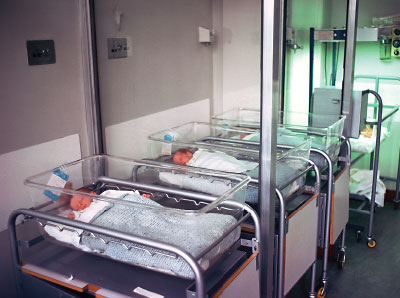COVID-19’s Impact on Development Remains Unclear
Abstract
Six-month-olds who were exposed to COVID-19 in utero achieved similar developmental milestones as those who were not exposed to the virus, a study in JAMA Pediatrics found. However, many questions about the effects of COVID-19 exposure on development remain.

As COVID-19 began to spread around the world in 2020, many wondered and worried what the effects of the virus might be on babies who were exposed in utero.
A study in JAMA Pediatrics suggests that babies born to women who contracted COVID-19 during pregnancy performed similarly on developmental milestones at six months as those babies born to women who did not contract COVID-19. However, when the researchers compared babies born between March and December 2020 with babies born one year before the pandemic, they found that babies born during the pandemic had lower scores on motor and social skills assessments.
“It is important to stress that we did not observe frank differences between the two sets of babies,” said study investigator Dani Dumitriu, M.D., Ph.D., an assistant professor of pediatrics (in psychiatry) at Columbia University Medical Center. “These were subtle downward shifts in some developmental milestones.” At the same time, since hundreds of millions of children have been born during the pandemic, Dumitriu said these small individual differences add up to a global public health concern.
Dumitriu and her colleagues made use of data from Columbia’s COVID-19 Mother Baby Outcomes Initiative—a prospective cohort study that has been enrolling pregnant women since the first wave of COVID-19 hit New York in the spring of 2020. The researchers focused on data from 255 mothers, including 114 who had been infected by COVID-19 while pregnant. All the participants filled out the Ages & Stages Questionnaire (ASQ) when their children reached about six months of age. The ASQ is a validated tool that measures five key developmental domains: communication, fine motor skills, gross motor skills, problem solving, and personal-social skills.
When comparing babies born to mothers who had contracted COVID-19 with those whose mothers had not, the research team found no differences in performance for any of the five domains. “We looked at that data every way you could imagine,” Dumitriu told Psychiatric News, noting that they analyzed the effects of infection timing, severity, and/or whether the babies needed neonatal intensive care after birth.
The researchers next compared the six-month ASQ scores of the babies born during the pandemic with the six-month ASQ scores of babies born before the pandemic (these data were collected between November 2017 and January 2020 as part of a separate study at Columbia examining how gestational diabetes affects neurodevelopment).
Compared with the babies born before the pandemic, those born during the pandemic scored statistically lower on the ASQ domains of fine motor skills, gross motor skills, and personal-social skills.
“Motor skills tend to be readily affected by stress during pregnancy, so it was not surprising that these domain scores dropped during the pandemic,” Dumitriu said. She added that the drop in social skills could be related to pandemic-era societal changes, including greater social isolation and mask wearing.
These results are not the first indication that the pandemic has had an adverse impact on neurodevelopment. Late in 2021, researchers at Brown University published preliminary data from their own ongoing cohort of children that started back in 2011. These data revealed that children born during the pandemic whose mothers had not contracted COVID-19 scored significantly lower on cognitive assessments relative to children born between 2011 and 2019 at similar ages.
Dumitriu told Psychiatric News that the Brown study also looked at early-life domains, including motor skills and communication, but used a clinician-administered tool known as the Mullen Scales of Early Learning rather than the parent-completed ASQ. “While the overarching concepts are the same,” key differences in how the children were assessed must be taken into consideration, she said. Dumitriu added that the COVID-era assessments were done by clinicians wearing masks—which had not been the case previously—and that might have impacted the children’s reactions.
More recently, researchers at Massachusetts General Hospital released preliminary data that suggest babies born to mothers who experienced a COVID-19 infection during pregnancy were about twice as likely to be diagnosed with a neurodevelopmental disorder by 12 months of age as babies who were not exposed to COVID-19.
For the study, the researchers focused on medical diagnoses recorded in electronic health records rather than developmental assessments of babies born between March and September 2020. The researchers noted that physicians might have been more inclined to give a neurodevelopmental disorder diagnosis to the babies, given concerns over their exposure to COVID-19 when in utero. Many questions about the effects of COVID-19 exposure on development remain, given that even the oldest exposed children are not yet 3 years old.
“Other groups are exploring this issue as well, and it’s critical that new data keep coming in so we can replicate these findings and see how development progresses over time,” Dumitriu said. “We have to remember that each study is just a snapshot in time. It’s possible these infants [born during the pandemic] will catch up developmentally by age two or three, or maybe the gap will keep growing.”
As the data come in, Dumitriu said there is plenty that parents can do to promote healthy development. “The messaging is not that different from before: minimize screen time as much as possible, socialize, and spend time outdoors.” ■
“Association of Birth During the COVID-19 Pandemic With Neurodevelopmental Status at 6 Months in Infants With and Without In Utero Exposure to Maternal SARS-CoV-2 Infection” is posted here.
“Impact of the COVID-19 Pandemic on Early Child Cognitive Development: Initial Findings in a Longitudinal Observational Study of Child Health” is posted here.
“Neurodevelopmental Outcomes at One Year in Offspring of Mothers Who Test Positive for SARS-CoV-2 During Pregnancy” is posted here.



